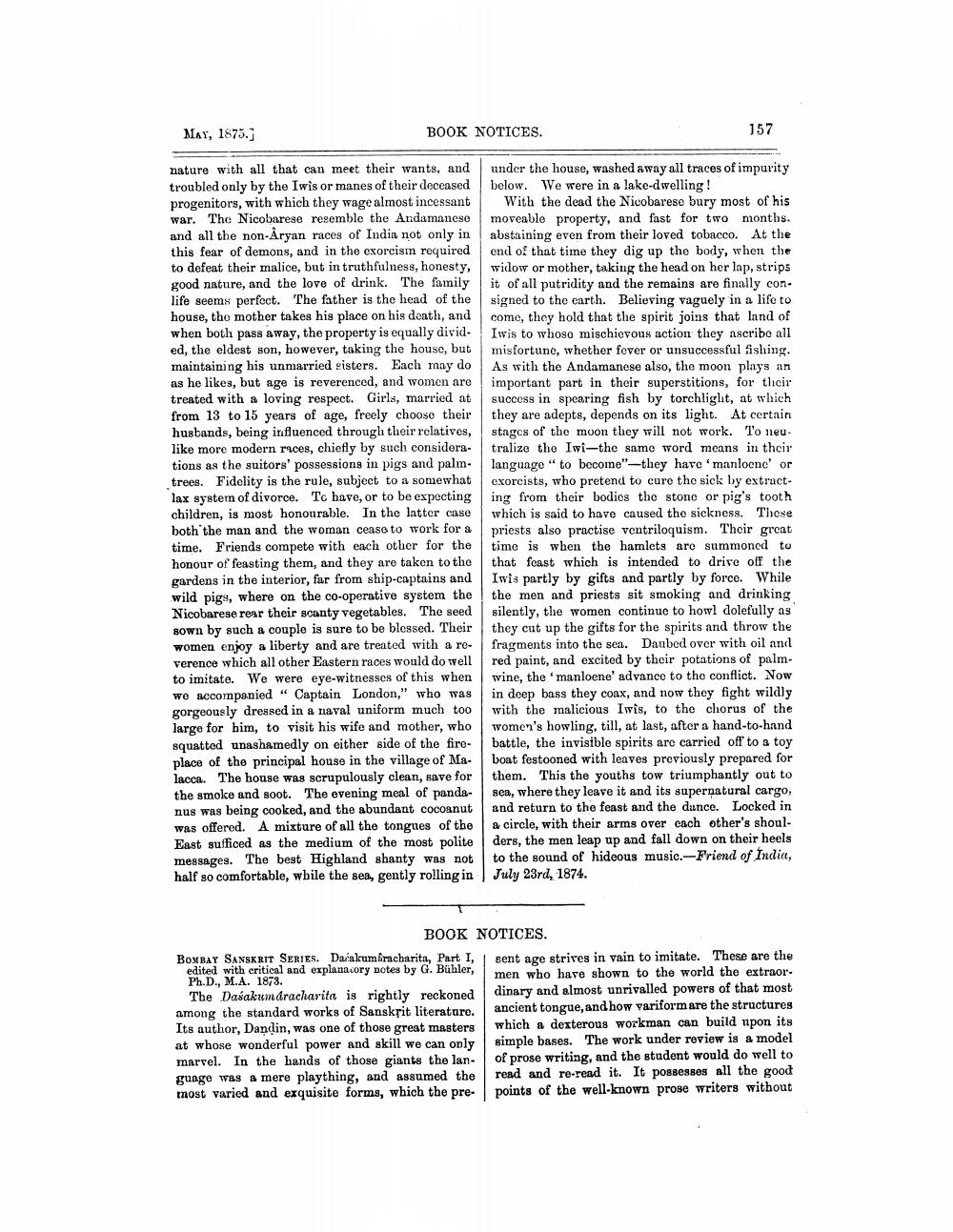________________
Mar, 1875.]
BOOK NOTICES.
157
nature with all that can meet their wants, and troubled only by the Iwis or manes of their deceased progenitors, with which they wage almost incessant war. The Nicobarese resemble the Andamanese and all the non-Aryan races of India not only in this fear of demons, and in the exorcism required to defeat their malice, but in truthfulness, honesty, good nature, and the love of drink. The family life seems perfoct. The father is the head of the house, the mother takes his place on his death, and when both pass away, the property is equally divid. ed, the eldest son, however, taking the house, but maintaining his unmarried sisters. Each may do as he likes, but age is reverenced, and women are treated with a loving respect. Girls, married at from 13 to 15 years of age, freely choose their husbands, being influenced through their relatives, like more modern rices, chiefly by such considerations as the suitors' possessions in pigs and palm. trees. Fidelity is the rule, subject to a somewhat lax system of divorce. Tc have, or to be expecting children, is most honourable. In the latter case both the man and the woman cease to work for a time. Friends compete with each other for the honour of feasting them, and they are taken to the gardens in the interior, far from ship-captains and wild pigs, where on the co-operative system the Nicobarese rear their scanty vegetables. The seed down by such a couple is sure to be blossed. Their women enjoy a liberty and are treated with a reverence which all other Eastern races would do well to imitate. We were eye-witnesses of this when we accompanied " Captain London," who was gorgeously dressed in a naval uniform much too large for him, to visit his wife and mother, who squatted unashamedly on either side of the fireplace of the principal house in the village of Malacca. The house was scrupulously clean, save for the smoke and soot. The evening meal of panda- nus was being cooked, and the abundant cocoanut was offered. A mixture of all the tongues of the East sufficed as the medium of the most polite messages. The best Highland shanty was not half so comfortable, while the sea, gently rolling in
under the house, washed away all traces of impurity below. We were in a lake-dwelling!
With the dead the Nicobarese bury most of his moveable property, and fast for two months. abstaining even from their loved tobacco. At the end of that time they dig up the body, when the widow or mother, taking the head on her lap, strips it of all putridity and the remains are finally con. it of all putridity and the remaine are signed to the earth. Believing vaguely in a life to come, they hold that the spirit joins that land of Iwis to whoso mischievous action they ascribe all misfortune, whether fover or unsuccessful Sishing. As with the Andamanose also, the moon plays an important part in their superstitions, for their success in spearing fish by torchliglit, at which they are adepts, depends on its light. At certain stages of the moon they will not work. To neutralize the Iwi-the same word means in thcir language " to become"-they have manloene' or exorcists, who pretend to cure the sick by extracting from their bodies the stone or pig's tooth which is said to have caused the sickness. These priests also practise ventriloquism. Their great time is when the hamlets are summoned to that feast which is intended to drive off the I wis partly by gifts and partly by force. While the men and priests sit smoking and drinking silently, the women continue to howl dolefully as they cut up the gifts for the spirits and throw the fragments into the sea. Daubed over with oil and red paint, and excited by their potations of palmwine, the 'manloene' advance to the conflict. Now in doep bass they conx, and now they fight wildly with the malicious Iwis, to the chorus of the women's howling, till, at last, after a hand-to-hand battle, the invisible spirits are carried off to a toy boat festooned with leaves previously prepared for them. This the youths tow triumphantly out to sea, where they leave it and its supernatural cargo, and return to the feast and the dance. Locked in a circle, with their arms over cach other's shoulders, the men leap up and fall down on their heels to the sound of hideous music.-Friend of India, July 23rd, 1874.
BOOK NOTICES. BOMBAY SANSKRIT SERIES. Dacakum gracharita, Part I, sent age strives in vain to imitate. These are the edited with critical and explanacory notes by G. Bühler, Ph.D., M.A. 1873.
men who have shown to the world the extraorThe Dasakumdracharita is rightly reckoned
dinary and almost unrivalled powers of that most among the standard works of Sanskfit literature. ancient tongue, and how variform are the structures Its author, Dandin, was one of those great masters
which a dexterous workman can build upon its at whose wonderful power and skill we can only simple bases. The work under review is a model marvel. In the hands of those giants the lan- of prose writing, and the student would do well to guage was a mere plaything, and assumed the read and re-read it. It possesses all the good most varied and exquisite forms, which the pre- points of the well-known prose writers without




